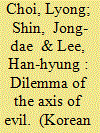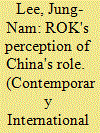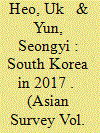| Srl | Item |
| 1 |
ID:
163367


|
|
|
|
|
| Summary/Abstract |
There are diverging assessments of China’s role in resolving the nuclear crisis on the Korean Peninsula. China’s role has been characterised variously as a bystander, arbiter, catalyst and mediator over the years. This paper aims to clarify where China stands on North Korea and assesses the different phases of the Chinese approach to conflict resolution during the North Korean nuclear crisis. The main argument is that China wishes to maintain the regional status quo while appearing to adjust its position in line with the international community. China’s current duplicity stems from its different priorities and concerns to the remainder of the world, and can best be explained using a role theory analysis.
|
|
|
|
|
|
|
|
|
|
|
|
|
|
|
|
| 2 |
ID:
169153


|
|
|
|
|
| Summary/Abstract |
This research examines the international relations between North Korea (the
Democratic People’s Republic of Korea or DPRK) and Iran in the context of their
shared perception of a threat from the United States. We discuss the conventional
idea of the international relationship—the enemy of my enemy is my ally—to
explain Pyongyang–Tehran relations, evaluate its past and current relations, and
offer policy suggestions for the recent denuclearization approach toward North
Korea and Iran. Using newly discovered archival resources and political records, we
challenge the conventional idea that the two states share the same threat perception
in a consistent manner and suggest the level of their military cooperation changes
depending on the approach from Washington and the international community. This
research provides a more exact picture of the international relations North Korea
and Iran since the 1980s and of the link between their shared threat perception and
denuclearization debates.
|
|
|
|
|
|
|
|
|
|
|
|
|
|
|
|
| 3 |
ID:
112863


|
|
|
|
|
| Publication |
2012.
|
| Summary/Abstract |
When is a two-track policy approach of coercion and conciliation more or less likely to achieve its target objective? The first North Korean nuclear crisis of 1993-94 reveals that a U.S. policy approach combining coercive and conciliatory diplomacy contributed to near-term U.S. policy objectives when conciliation was offered to North Korea in order to signal benign intent. This case also reveals two additional conditions that can hinder a two-track policy from achieving its policy aims: shifting how the objectives of coercive signals and actions are prioritized throughout the course of a crisis, and relying on international institutions and foreign governments for the implementation of a two-track policy.
|
|
|
|
|
|
|
|
|
|
|
|
|
|
|
|
| 4 |
ID:
174120


|
|
|
|
|
| Summary/Abstract |
The 1994 Agreed Framework called for North Korea to dismantle its plutonium-production complex in exchange for civilian light water reactors (LWRs) and the promise of political normalization with the United States. The accord succeeded at rolling back North Korea's nuclear program, but the regime secretly began enriching uranium when the LWR project fell behind schedule. Today, scholars look back at the Agreed Framework as a U.S. offer of “carrots” to bribe the regime, but this framing overlooks the credibility challenges of normalization and the distinctive technical challenges of building LWRs in North Korea. A combiniation of political and technical analysis reveals how the LWR project helped build credibility for the political changes promised in the Agreed Framework. Under this interpretation, the LWR project created a platform for important breakthroughs in U.S.-North Korean engagement by signaling a U.S. commitment to normalization, but its signaling function was undercut when the United States displaced the costs of LWR construction to its allies. The real challenge of proliferation crisis diplomacy is not to bribe or coerce target states into giving up nuclear weapons, but to credibly signal a U.S. commitment to the long-term political changes needed to make denuclearization possible.
|
|
|
|
|
|
|
|
|
|
|
|
|
|
|
|
| 5 |
ID:
111698


|
|
|
| 6 |
ID:
160388


|
|
|
|
|
| Summary/Abstract |
The biggest story of 2017 in South Korea was the impeachment of President Park Geun-hye and the election of Moon Jae-in, shifting power from conservative to progressive. The economy showed signs of recovery despite multiple concerns. The North Korean nuclear crisis intensified tensions in the region.
|
|
|
|
|
|
|
|
|
|
|
|
|
|
|
|